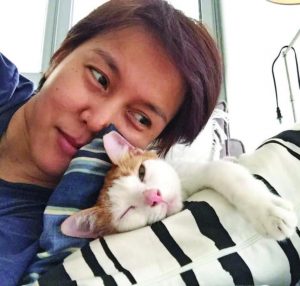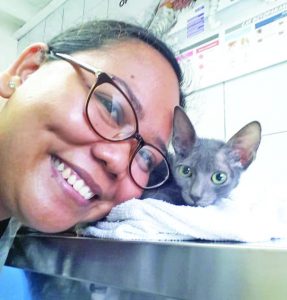“But that isn’t a parent-child relationship. It’s a pet-pet owner relationship.”
Describing the bond between a human and a feline, cat owner Torie Bosch wrote this in her online column in 2013. There was a flood of comments online, ranging from total agreement to savage protest.
While Bosch’s main reason for frowning upon the phrase “cat parent” was based on a legit fear—that of the pet industry attempting to emotionally blackmail cat lovers into purchasing unnecessary pet merchandise—I feel that this is not enough reason to stop calling felines our fur-babies, and ourselves, purrents.

Four good reasons come to mind.
Family is not necessarily defined by blood or species
While it is easy to understand that adoption yields families that do not share a common gene pool, it might be difficult for others to accept that many families are comprised of different species—some with fur, some without.

However, families with mixed species are not at all unnatural—and not unique to humans and cats, either. There’s the mother dog that took in a young squirrel while caring for her own litter, the group of apes that cared for a cat the way they did their own offspring, and the sperm whales that adopted a dolphin, according to a 2013 article by Christine Dell’Amore published in National Geographic.
What was also worth noting, the article went on to say, was how these multi-species alliances were formed not only because of the instinct to survive and thrive, but also out of empathy.
With nature boasting of adoptive families having more than one species in their fold, it shouldn’t come as a surprise that when someone adopts a cat, their relationship transcends mere ownership, quite possibly resembling the bond between parent and biological child.
Purrenthood is a tribute, not an affront, to parenthood
If anything, the parental love that we have for our fur-babies is both tribute and testament to the unconditional love that our parents have for us.
Feeling like a parent—and acting like one—when dealing with a beloved cat shines a bright light on what makes humankind good: compassion. The kindness someone shows for a creature they do not need to help says a lot about what their own parents taught them.
In its purest form, love knows no bounds…and it knows no species, either.

Cats are not merely a band-aid solution for loneliness
To some who can’t have children, cats provide invaluable companionship. To others, however, cats are not a substitute for human interaction but a deliberate preference.
I don’t need to spell this out: humans can be real jerks. Cats, too—but not as much as people who happen to hold the record for causing the extinction of the most number of animal species. No wonder many of us choose to share our lives with animals!
Then again, picking cats over humans is not simply an attempt to avoid disappointment and sorrow. Cats are bound to die before we do, and one of the greatest heartbreaks we will ever experience as purrents is when a cat crosses the rainbow bridge way too soon.
“Purrenthood” discourages cat owners from treating felines as disposable property
Some people buy pets, only to dispose of them once they become an inconvenience. Does the cat pee everywhere? The cat ends up being dumped somewhere so that s/he never comes back. Does the cat scratch expensive furniture? S/He gets sold to the highest bidder; it doesn’t matter if the buyer will kill the feline for a crush video.
Some people even buy purebred cats to breed them for profit. To these backyard breeders, animals share the same status as—or perhaps even less than—an expendable gadget.
Spreading the purrenthood mentality around means educating people about the great bond that can (and should) exist between a pet and a human. It helps inform people that pets are not merely property, and that they should be loved as members of the family.
This, to me, is the most important reason of all.
NO DICHOTOMY

Yes, it is absolutely okay to call yourself a cat parent. However, don’t hesitate to call yourself a pet owner, either—at least from a legal standpoint.
Pet ownership laws protect cats from abuse and neglect. Because of laws that clearly define pet ownership, any irresponsible cat parent will be meted out punishment.
In an ideal world, pets would not be considered property, which means they couldn’t be “owned”. But for as long as there are people who don’t take their role as pet owners—not to mention that as cat parents—seriously, laws on pet ownership are a necessity.
In effect, we are both pet owners and cat parents. There should be no dichotomy to begin with. These two labels work in tandem to keep cats safe.
Of course, with the former being a legal term, it will never completely encompass the nuanced relationship between people and the cats who have enslaved their hearts. In that case, let us feel free to say our cats are our fur-babies… and us, their loving purrents.
Er, just don’t get duped into buying useless cat stuff.
This appeared in Animal Scene magazine’s November 2017 issue.






